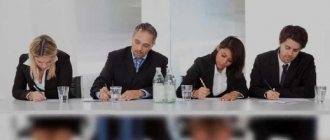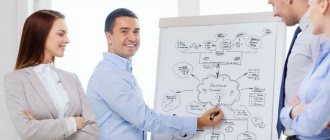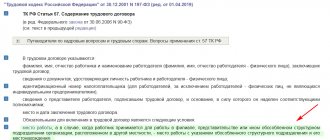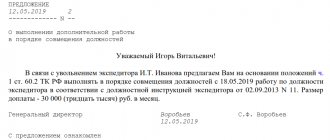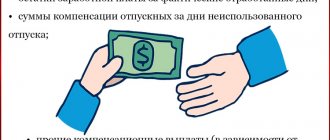Article 56 of the Labor Code of the Russian Federation. The concept of an employment contract. Parties to the employment contract
An employment contract is an agreement between an employer and an employee, according to which the employer undertakes to provide the employee with work for a specified labor function, to provide working conditions provided for by labor legislation and other regulatory legal acts containing labor law norms, a collective agreement, agreements, local regulations and by this agreement, to pay the employee wages in a timely manner and in full, and the employee undertakes to personally perform the labor function defined by this agreement and to comply with the internal labor regulations in force for this employer. The parties to the employment contract are the employer and the employee.
Article 57 of the Labor Code of the Russian Federation. Contents of the employment contract
The employment contract indicates: surname, name, patronymic of the employee and the name of the employer (surname, name, patronymic of the employer - an individual) who entered into the employment contract; information about documents proving the identity of the employee and the employer - an individual; taxpayer identification number (for employers, with the exception of employers - individuals who are not individual entrepreneurs); information about the employer’s representative who signed the employment contract and the basis on which he is vested with the appropriate powers; place and date of conclusion of the employment contract. The following conditions are mandatory for inclusion in an employment contract: place of work, and in the case where an employee is hired to work in a branch, representative office or other separate structural unit of the organization located in another locality - place of work indicating the separate structural unit and its location; labor function (work according to the position in accordance with the staffing table, profession, specialty indicating qualifications; specific type of work assigned to the employee). If, in accordance with this Code and other federal laws, the performance of work in certain positions, professions, specialties is associated with the provision of compensation and benefits or the presence of restrictions, then the names of these positions, professions or specialties and the qualification requirements for them must correspond to the names and requirements specified in qualification reference books approved in the manner established by the Government of the Russian Federation, or the relevant provisions of professional standards; the date of commencement of work, and in the case where a fixed-term employment contract is concluded, also the period of its validity and the circumstances (reasons) that served as the basis for concluding a fixed-term employment contract in accordance with this Code or other federal law; terms of remuneration (including the size of the tariff rate or salary (official salary) of the employee, additional payments, allowances and incentive payments); working hours and rest hours (if for a given employee it differs from the general rules in force for a given employer); compensation for hard work and work under harmful and (or) dangerous working conditions, if the employee is hired under appropriate conditions, indicating the characteristics of working conditions in the workplace; conditions that determine, in necessary cases, the nature of the work (mobile, traveling, on the road, other nature of work); a condition on compulsory social insurance of the employee in accordance with this Code and other federal laws; other conditions in cases provided for by labor legislation and other regulatory legal acts containing labor law norms. If, when concluding an employment contract, it did not include any information and (or) conditions from those provided for in this article, then this is not a basis for recognizing the employment contract as not concluded or for its termination. The employment contract must be supplemented with missing information and (or) conditions. In this case, the missing information is entered directly into the text of the employment contract, and the missing conditions are determined by an annex to the employment contract or a separate agreement of the parties, concluded in writing, which are an integral part of the employment contract. The employment contract may provide for additional conditions that do not worsen the employee’s position in comparison with established labor legislation and other regulatory legal acts containing labor law norms, collective agreements, agreements, local regulations, in particular: on clarification of the place of work (indicating the structural unit and its location) and (or) about the workplace; about the test; on non-disclosure of secrets protected by law (state, official, commercial and other); on the employee’s obligation to work after training for no less than the period established by the contract, if the training was carried out at the expense of the employer; on the types and conditions of additional employee insurance; on improving the social and living conditions of the employee and his family members; on clarification, in relation to the working conditions of a given employee, of the rights and obligations of the employee and the employer established by labor legislation and other regulatory legal acts containing labor law norms. By agreement of the parties, the employment contract may also include the rights and obligations of the employee and employer established by labor legislation and other regulatory legal acts containing labor law norms, local regulations, as well as the rights and obligations of the employee and employer arising from the terms of the collective agreement and agreements . Failure to include any of the specified rights and (or) obligations of the employee and employer in the employment contract cannot be considered as a refusal to exercise these rights or fulfill these obligations.
NEW DRAFT CHAPTER X of the Labor Code of the Russian Federation “Occupational Safety and Health”
On December 8, 2021, project No. 1070354-7 “On amendments to the Labor Code of the Russian Federation in terms of improving mechanisms for preventing industrial injuries and occupational illnesses” was sent for consideration to the State Duma.
Changes to Chapter X on labor protection in the Labor Code will affect risk assessment, work with personal protective equipment, investigations of microtraumas and new rules and responsibilities of the employer.
According to the decision of the relevant State Duma committee, the bill will be considered by parliamentarians in January 2021.
Basic moments:
1. Article 209 “Basic concepts”
A new concept has been added – “danger”:
“Danger is a potential source of harm to a worker’s health during work activities.”
In addition, the project notes that safe working conditions directly depend on PPE and occupational risk management:
“Safe working conditions are working conditions under which the employee’s exposure to harmful and (or) hazardous production factors is excluded or their levels, taking into account the use of personal (collective) protective equipment and occupational risk management, do not exceed established standards.”
New article – Article 209.1 “Basic principles of ensuring occupational safety”
This section was not included in the previous edition. The new clause notes principles such as prevention, prevention of hazards and minimization of damage to workers' health.
Article 214 “Obligations of the employer in the field of labor protection”
The new document expanded the employer’s responsibilities for labor protection in accordance with the new principles.
Thus, it is necessary to ensure safe working conditions, based on the prevention and prevention of hazards, as well as minimizing damage to the health of workers.
This includes identifying hazards and occupational risks, conducting regular analysis and assessment, as well as keeping records of microtraumas and investigating the causes of their occurrence.
Microtraumas are injuries that do not result in health problems or temporary disability for the employee.
It is noted that the procedure for assessing occupational risks must be carried out before commissioning production facilities and newly organized workplaces.
In addition, the employer will be required to comply with general requirements for organizing safe workplaces. The Ministry of Labor of the Russian Federation will determine them in a separate regulatory legal act, in accordance with Part 7 of Art. 209 of the new edition of the Labor Code.
Also, according to the project, the process of dismissing employees responsible for an accident will be simplified for employers (clause 6, part 1, article 81).
Employers will also have rights, namely:
- conduct electronic document management in the field of labor protection;
- use equipment for remote video, audio or other recording for the purpose of monitoring work safety;
- Conduct an independent assessment of compliance with labor legislation: for this, Rostrud will create a special website where you can undergo self-examination using special checklists.
Article 214.1. “Ban on working in hazardous working conditions”
The innovation states: if, based on the results of a special assessment of working conditions, a workplace is assigned class 4, then the employer must suspend work in a dangerous workplace.
It will be possible to resume activities only upon confirmation of a reduction in the class of working conditions based on the results of an unscheduled special labor assessment.
Article 218 “Professional risks”
The new edition defines the rules for risk assessment: how to identify hazards and what procedures to carry out for this.
The employer will not only have to identify and assess hazards, but also reduce the level of occupational risks. Hazard identification requires detection, recognition, and description of hazards, including their sources, conditions of occurrence, and potential consequences in the management of freebies.
What can an employer do at this time?
- We recommend conducting an assessment of professional risks, because there are already recorded precedents for establishing administrative liability (fines) for failure to carry it out.
- In addition, microtrauma recording can be gradually introduced. This is primarily to ensure that workers understand that even minor injuries can result in serious injury or death.
Check out the draft document:
Changes to Article X of the Labor Code of the Russian Federation
Source: Press service of SRG-ECO
Article 58 of the Labor Code of the Russian Federation. Duration of the employment contract
Employment contracts may be concluded: 1) for an indefinite period; 2) for a certain period of not more than five years (fixed-term employment contract), unless a different period is established by this Code and other federal laws. A fixed-term employment contract is concluded when the employment relationship cannot be established for an indefinite period, taking into account the nature of the work to be done or the conditions for its implementation, namely in the cases provided for in part one of this Code. In the cases provided for by part two of this Code, a fixed-term employment contract may be concluded by agreement of the parties to the employment contract without taking into account the nature of the work to be performed and the conditions for its implementation. If the employment contract does not specify the duration of its validity, the contract is considered to be concluded for an indefinite period. In the event that neither party has requested termination of a fixed-term employment contract due to its expiration and the employee continues to work after the expiration of the employment contract, the condition on the fixed-term nature of the employment contract loses force and the employment contract is considered concluded for an indefinite period. An employment contract concluded for a specific period in the absence of sufficient grounds established by the court is considered concluded for an indefinite period. It is prohibited to conclude fixed-term employment contracts in order to evade the provision of rights and guarantees provided for employees with whom an employment contract is concluded for an indefinite period.
Article 59 of the Labor Code of the Russian Federation. Fixed-term employment contract
A fixed-term employment contract is concluded: for the duration of the performance of the duties of an absent employee, who, in accordance with labor legislation and other regulatory legal acts containing labor law norms, a collective agreement, agreements, local regulations, and an employment contract, retains his place of work; for the duration of temporary (up to two months) work; for performance when, due to natural conditions, work can only be carried out during a certain period (season); with persons sent to work abroad; for carrying out work that goes beyond the normal activities of the employer (reconstruction, installation, commissioning and other work), as well as work related to a deliberately temporary (up to one year) expansion of production or the volume of services provided; with persons entering work in organizations created for a predetermined period or to perform a predetermined job; with persons hired to perform obviously defined work in cases where its completion cannot be determined by a specific date; to perform work directly related to the internship and professional training of the employee; in cases of election for a certain period to an elected body or to an elective position for paid work, as well as employment related to the direct support of the activities of members of elected bodies or officials in state authorities and local self-government bodies, in political parties and other public associations; with persons sent by employment services to temporary work and public works; with citizens sent to perform alternative civil service; in other cases provided for by this Code or other federal laws. By agreement of the parties, a fixed-term employment contract can be concluded: with persons entering work for employers - small businesses (including individual entrepreneurs), the number of employees of which does not exceed 35 people (in the field of retail trade and consumer services - 20 people); with age pensioners entering work, as well as with persons who, for health reasons, in accordance with a medical certificate issued in the manner established by federal laws and other regulatory legal acts of the Russian Federation, are allowed to work exclusively of a temporary nature; with persons entering work in organizations located in the Far North and equivalent areas, if this is related to moving to the place of work; to carry out urgent work to prevent disasters, accidents, accidents, epidemics, epizootics, as well as to eliminate the consequences of these and other emergency circumstances; with persons elected through a competition to fill the relevant position, conducted in the manner established by labor legislation and other regulatory legal acts containing labor law norms; with creative workers of the media, cinematography organizations, theaters, theatrical and concert organizations, circuses and other persons involved in the creation and (or) performance (exhibition) of works, in accordance with the lists of works, professions, positions of these workers, approved by the Government of the Russian Federation Federation, taking into account the opinion of the Russian Tripartite Commission for the Regulation of Social and Labor Relations; with managers, deputy managers and chief accountants of organizations, regardless of their legal forms and forms of ownership; with persons studying full-time; with crew members of sea vessels, inland navigation vessels and mixed (river-sea) navigation vessels registered in the Russian International Register of Vessels; with persons applying for part-time work; in other cases provided for by this Code or other federal laws.
What to expect from changes to Section X of the Labor Code
The text of the DRAFT Federal Law “On Amendments to Certain Legislative Acts of the Russian Federation (in terms of improving mechanisms for the prevention of industrial injuries and occupational morbidity, compliance with labor legislation) has been published on a single portal for posting information on the development of federal executive authorities of draft normative legal acts and the results of their public discussion. and other regulatory legal acts containing labor law norms)” (as amended on September 25, 2018).
The project was prepared by the Ministry of Labor of Russia in accordance with paragraph 7 of the Plan of Legislative Activities of the Government of the Russian Federation, approved by Order of the Government of the Russian Federation dated December 23, 2021 No. 2925-r, and in pursuance of paragraph 2 of Section I of the minutes of the meeting of the Government of the Russian Federation dated August 4, 2015. No. 28, which provides for the improvement of legislation in terms of the formation of a preventive model for ensuring the safety of workers at work, the implementation of control and supervisory activities in the field of labor protection, as well as paragraph 6 of the minutes of the meeting with the Chairman of the Government of the Russian Federation of September 9, 2021 No. DM-P12 -58 Ave.
Let us recall that the Ministry of Labor posted a notification about the development of this project on January 30, 2015, and as of October 1, 2021, not only the discussion procedure was completed, but also the regulatory impact assessment (RIA) procedures and the anti-corruption examination of the Project.
The changes proposed by the Project affect a wide range of people:
- employers,
- workers,
- medical organizations,
— organizations carrying out special assessments of working conditions,
— state supervisory authorities for compliance with labor and sanitary-epidemiological legislation
The purpose of the proposed changes: to ensure the implementation of advanced achievements in the field of labor protection, the full implementation of assessment and management of occupational risks in the labor protection management system in order to increase the effectiveness of measures in the field of labor protection, the convergence and harmonization of the legislation of the Russian Federation in the field of labor protection with similar standards in countries European Union.
The notice of the beginning of the development of the Project states that with the entry into force on January 1, 2014, federal laws of December 28, 2013 No. 426-FZ “On special assessment of working conditions” and of December 28, 2013 No. 421-FZ “ On amendments to certain legislative acts of the Russian Federation in connection with the adoption of the Federal Law “On Special Assessment of Working Conditions”, the implementation of SOUT was ensured in order to establish the real state of working conditions in the workplace. However, at the same time, the issues of assessing the injury risk of workplaces, taking into account the health status and individual psycho-physiological characteristics of workers employed in specific workplaces remained unaccounted for, which does not allow employers to adequately ensure optimal labor productivity. In this regard, a decision was made to develop a bill “On Amendments to the Labor Code of the Russian Federation (in terms of improving labor legislation in the field of labor protection)”, the adoption of which will ensure that the listed factors are taken into account as a result of the full implementation of assessment and management of professional risks in the management system labor protection, convergence and harmonization of labor protection legislation of the Russian Federation with similar standards of the European Union countries.
The amendments to the Labor Code proposed by the bill were prepared taking into account the results of law enforcement practice of labor legislation and are aimed at improving mechanisms for stimulating employers to improve working conditions, ensuring the priority implementation and development of a system for preventing industrial injuries and occupational diseases in order to preserve the life and health of workers at work, and developing a surveillance system for compliance with the requirements of labor legislation and other regulatory legal acts containing labor law standards.
In accordance with the rules of legal technology, the bill, along with changes to certain articles of the Labor Code of the Russian Federation, provides for the presentation of Section X “Labor Safety” in a new edition.
The new edition of Section X “Occupational Safety and Health” of the Labor Code of the Russian Federation provides for the following chapters:
"General provisions";
“State management of labor protection”;
“Rights and obligations of the employer and employee in the field of labor protection”;
“Management of occupational safety and health at the employer”;
“Occupational safety requirements for production facilities and means of production”;
“Investigation, registration (review) and recording of microdamages (microtraumas), occupational diseases, accidents.”
Changes to the Labor Code of the Russian Federation provide for:
— structuring the basic procedures for managing labor protection at the employer with clarification of the rights and obligations of the subjects of labor relations, as well as the procedure for the activities of the service and committee (commission) created at the employer for labor protection in the implementation of labor protection management;
— increasing the level of protection of workers’ rights to work in conditions that meet labor protection requirements by establishing a ban on working in hazardous working conditions;
— introduction of occupational risk management into the occupational safety and health management system;
— modernization of the existing approach to the implementation of safety measures through the transition from the provision of personal protective equipment depending on the name of the profession (position) of the employee employed at a particular workplace (list approach), to the provision of personal protective equipment depending on the harmful production factors present in the workplace;
— improving the procedure for investigating and recording industrial accidents in order to prevent concealment of microdamages (microtraumas).
The proposed amendments will ensure the implementation of the concept of framework participation of the state in the construction of an OSMS for a particular employer, providing for broad autonomy of the employer in choosing means of managing occupational safety and health, including management of occupational risks; in making decisions on preventive and reactive measures, taking into account the specifics of production, the technologies, equipment and materials used.
At the same time, as part of the ongoing work to update labor protection rules, taking into account the provisions of the bill, drafts of these rules will also be developed taking into account the broad autonomy of the employer in choosing labor protection management tools.
In addition, the bill provides for the addition of the Labor Code of the Russian Federation with norms that ensure the improvement of the system of state supervision (control) over compliance with the requirements of labor legislation.
One of the key ways to prevent the consequences of offenses, which has proven its effectiveness, is the introduction of an internal control system or “self-inspection regime” into the activities of business entities, which is currently effectively used in monitoring the financial activities of the employer.
For these purposes, the bill provides for the introduction of the institution of self-assessment of compliance with the requirements of labor legislation and other regulatory legal acts containing labor law norms (self-control), the main tool of which should be checklists for compliance with the requirements of labor legislation. This institute is proposed to be introduced as an employer’s right, i.e. The bill provides for the voluntary implementation of such a system.
In order to encourage employers to implement this system, the results of self-assessment (self-monitoring), if properly implemented and the results are submitted to the state supervisory authority, will be used by the latter as additional criteria for classifying employers into a certain risk category when organizing state supervision of compliance with labor legislation requirements (risk-based approach).
The implementation of such an approach will create an environment for the formation of law-abiding behavior of the employer, increasing the level of safety culture, eliminating the causes and conditions for committing offenses, and reducing their number.
Taking into account the fact that the creation of committees (commissions) on labor protection is not mandatory (they are created at the initiative of the employer and (or) employees), the bill provides for amendments to subparagraph “d” of paragraph 6 of part one of Article 81 of the Labor Code of the Russian Federation, aimed to clarify the grounds for termination of an employment contract in the event of an employee’s violation of labor protection requirements, if this violation entailed serious consequences (work accident, accident, catastrophe) or knowingly created a real threat of such consequences.
In order to bring the provisions of the Labor Code of the Russian Federation into conformity with the Federal Law of June 28, 2014 No. 172-FZ “On Strategic Planning in the Russian Federation”, in a number of articles of the Labor Code of the Russian Federation the words “federal target programs” are replaced with the words “state programs” .
In addition, in order to ensure maximum consideration of the interests of participants in labor relations, the bill provides that decisions of local governments on introducing additional conditions and indications for mandatory medical examinations for employers should be taken taking into account the opinion of territorial tripartite commissions for the regulation of social and labor relations and the corresponding territorial sanitary and epidemiological surveillance authority.
The adoption of the bill will help achieve the goals and fulfill the tasks of the “Safe Work” subprogram of the state program of the Russian Federation “Promoting Employment,” as well as:
— implementation of advanced achievements in the field of labor protection;
— completion of the construction of an active occupational safety management system;
— convergence and harmonization of labor protection requirements in the Russian Federation with similar requirements of the best world practices;
— recognition of the achievements of the Russian Federation in the field of protecting the life and health of workers and raising its authority at the international level.
The bill does not contradict the provisions of the Treaty on the Eurasian Economic Union and other international treaties of the Russian Federation.
The adoption and implementation of the draft federal law will not require additional expenditures from the budget system of the Russian Federation, since the obligations provided for by the bill to comply with labor protection requirements have already been assigned to the employer by the Labor Code of the Russian Federation, and the implementation of the powers of federal executive bodies provided for by the bill will be carried out within the limits established by the Government of the Russian Federation. Federation of the staffing number of their employees and the envisaged expenses of the budget system for the implementation of the functions of the specified federal executive bodies.
Below we have noted and assessed as best we could the most important of the proposed changes:
You can familiarize yourself with other changes yourself by downloading the 80-page document from a file hosting service using the link.
Attention! The icing on the cake:
The Ministry of Economic Development gave a NEGATIVE opinion on this Project.
Source: regulatory legal acts project portal
Article 61 of the Labor Code of the Russian Federation. Entry into force of the employment contract
An employment contract comes into force from the day it is signed by the employee and the employer, unless otherwise established by federal laws, other regulatory legal acts of the Russian Federation or the employment contract, or from the day the employee is actually admitted to work with the knowledge or on behalf of the employer or his representative. The employee is obliged to begin performing his job duties on the date specified in the employment contract. If the employment contract does not specify the start date of work, the employee must begin work on the next working day after the contract enters into force. If the employee does not start work on the start date of work established in accordance with this article, then the employer has the right to cancel the employment contract. A canceled employment contract is considered unconcluded. Cancellation of an employment contract does not deprive the employee of the right to receive benefits for compulsory social insurance in the event of an insured event during the period from the date of conclusion of the employment contract until the day of its cancellation.
Main aspects of Art. 10 TK
At the beginning of the article it is stated that the generally recognized norms and principles of international law, as well as those international treaties to which the Russian Federation is a party, are part of the system of domestic law. In this statement, Art. 10 refers to the Constitution, which in its Art. 15 asserts the importance of internationally recognized legal norms, as well as their relevance as a source of law.
The next part of the article is devoted to the relationship between domestic and international sources of law. Following the Constitution, Art. 10 of the Labor Code indicates that if the provisions of an international treaty to which the Russian Federation is a party come into conflict with the rules and norms of domestic legislation affecting labor relations, then the provisions of the international treaty should be used.
Thus, Article 10 of the Labor Code not only indicates the importance of international provisions and treaties, but also prescribes their priority in comparison with domestic legal acts. Naturally, these treaties must be accepted and ratified by the Russian Federation in the prescribed manner.
Article 62 of the Labor Code of the Russian Federation. Issuing copies of work-related documents
Upon a written application from the employee, the employer is obliged, no later than three working days from the date of filing this application, to provide the employee with copies of documents related to work (copies of an order for employment, orders for transfers to another job, an order for dismissal from work; extracts from the work record book; certificates of wages, accrued and actually paid insurance contributions for compulsory pension insurance, period of work with a given employer, etc.). Copies of work-related documents must be properly certified and provided to the employee free of charge. Parts two and three are no longer valid.
professional lawyer for labor disputes (Moscow)
